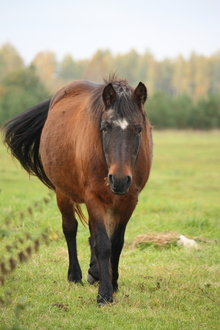Recently, EquiManagement and Boehringer Ingelheim Vetmedica, Inc. (BIVI) cohosted âRethinking the Signs of PPID,â a webinar focusing on the recognition and diagnosis of pituitary pars intermedia dysfunction (PPID), with speaker Dr. Steve Grubbs, DVM, Ph.D., DACVIM and BIVI equine technical manager.

Recognizing symptoms of PPID in your horse
Study results showed that the prevalence of PPID increased significantly with a horse's age, above-normal levels of insulin and above-normal levels of glucose.
The webinar, which originally aired on Monday, May 23, can be accessed at equimanagement.com/video/rethinking-signs-ppid-equine-cushings-disease-53172.
PPID is the most common endocrine disorder identified in horses. PPID manifests itself differently in individually affected horses. The severity of the disease can also vary.
Dr. Grubbs discussed the risk factors, such as breed and age, and stressed the necessity of identifying the early signs of the disease. He presented recent research from the ID PPID study, which tested the epidemiological characteristics of 526 horses that exhibited one or more clinical signs of PPID, such as regional hypertrichosis or laminitis.
The results indicated that while the likelihood of testing positive for PPID increases with age, horses under the age of 10 are still susceptible. Itâs important to identify the early clinical signs in horses before PPID advances.
Study results showed that the prevalence of PPID increased significantly with age, above-normal levels of insulin and above-normal levels of glucose. Horse owners should regularly perform an overall health checkup and visit a veterinarian if they identify any clinical signs associated with PPID.
Based on the results, Dr. Grubbs expressed the importance of employing the âwhole horseâ diagnostic approach to PPID. This approach entails a physical examination, blood work and endocrine testing.
âAll horses should undergo a thorough physical examination to enable horse owners and veterinarians to recognize not only the presence of clinical signs, but the severity of these signs,â said Dr. Grubbs.
âThe early signs of PPID are not what veterinarians and horse owners typically consider to be PPID warning signs.â For a full listing of clinical signs, visit www.idppid.com
Dr. Grubbs concluded, âWe would like to especially thank all the veterinarians and their clients who enrolled horses in the ID PPID study. Without their participation, we would not have the valuable results and recommended practices regarding the early signs of PPID that we have now.â
About Boehringer Ingelheim Vetmedica, Inc.
Boehringer Ingelheim Vetmedica, Inc., (BIVI) develops, manufactures and markets novel and innovative solutions for the prevention and treatment of disease in the cattle, equine, pet and swine markets.
BIVI is the fifth largest animal health company in the U.S. and is a part of the global Boehringer Ingelheim Animal Health GmbH. Our U.S. headquarters are located within the KC Animal Health Corridor in St. Joseph, Mo., with other sites in Ames, Fort Dodge and Sioux Center, Iowa. We have 2,000 employees unleashing their collective passion to keep animals healthy every day.
With more than 3,800 employees worldwide, Boehringer Ingelheim Animal Health achieved net sales of about 1.4 billion euros in 2015. In our research-driven Animal Health business, Boehringer Ingelheim continually invests more than 11% of net sales of the Animal Health business in R&D.
Boehringer Ingelheim is one of the worldâs 20 leading pharmaceutical companies. Headquartered in Ingelheim, Germany, Boehringer Ingelheim operates globally through 145 affiliates and a total of some 47,500 employees.
The focus of the family-owned company, founded in 1885, is on researching, developing, manufacturing and marketing new medications of high therapeutic value for human and veterinary medicine.
Social responsibility is an important element of the corporate culture at Boehringer Ingelheim. This includes worldwide involvement in social projects through, for example, the initiative âMaking More Healthâ while also caring for employees.
Respect, equal opportunity and reconciling career and family form the foundation of mutual cooperation. The company also focuses on environmental protection and sustainability in everything it does.
For more information, please visit www.bi-vetmedica.com
